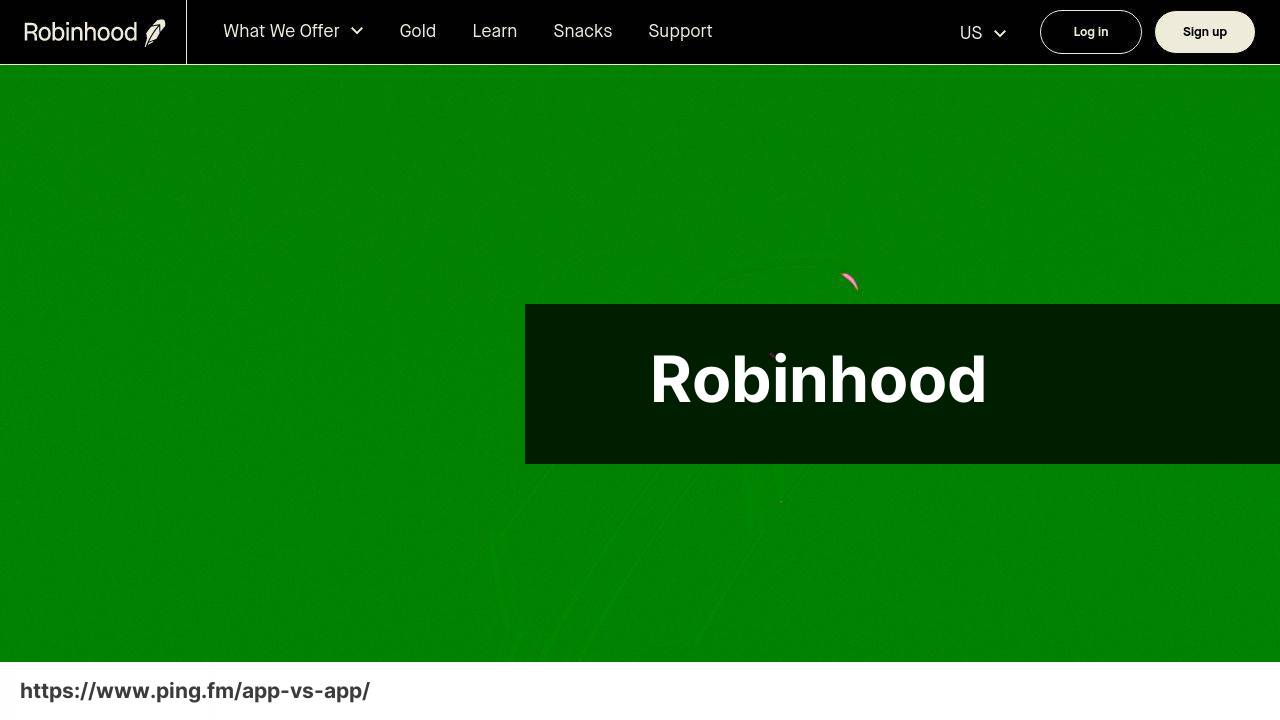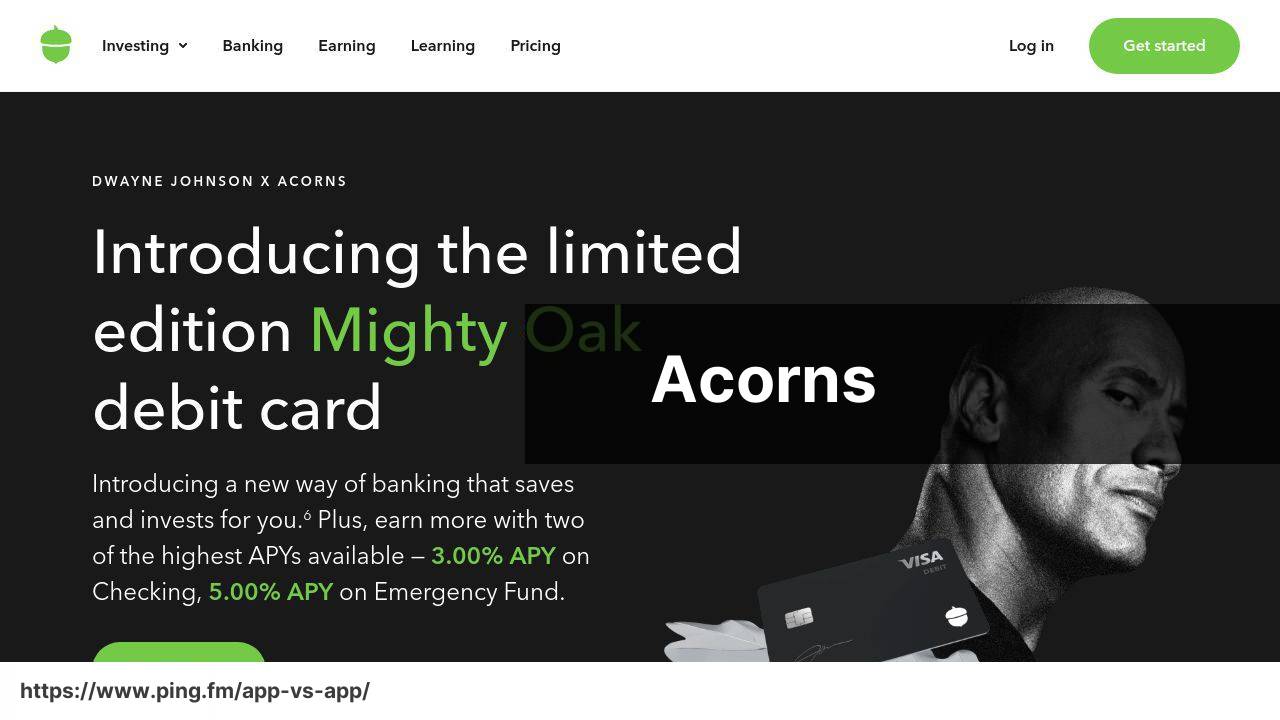Compare | Winner | |
| Ease of use | ||
| Fees and Costs | ||
| Customer Support | ||
| Investment Options | ||
| Security | ||
| Educational Resources | ||
| Account Minimum | ||
| Social Trading | ||
| Mobile Experience | ||
| Research Capabilities | ||
| FREE / PAID | Robinhood offers free trades and earns revenue from payments for order flow and interest on cash in customers’ accounts, Robinhood Gold costs $5 per month. | Acorns has a fee of $1, $2, or $3 per month depending on the plan you choose. The company uses a subscription-based model for monetization. |
| Conclusion | Robinhood makes investing easy for beginners and experts alike. A pioneer in commission-free trading , Robinhood really does let you get more from your money . | Acorns is your guide to financial wellness . It’s smart, simple, & secure ️. Start investing your spare change into your future and then grow with us from there . |
Robinhood Pros & Cons
Commission-free trading
User-friendly interface
Extended trading hours
️ High level of security
Bitcoin & Ethereum trades
Acorns Pros & Cons
Spare change investment option
Portfolio constructed by experts
Educational content
Beginner-friendly
Automatic rebalancing
Round-ups feature
Limited tools and analysis
❌ No advisory service
‼️ Recent legal issues
Customer service
Limited account types
No forex or futures trading
High fees for small accounts
☹️ No tax benefits
❌ Limited investment options
No direct control of portfolio
Slow investment process
Other best investing apps
🪙 Stash makes investing simple 🧠. It offers education 🎓, guidance 👥, and empowerment 🔑 to over 5 million people. Aiming to simplify investing, Stash is a solid choice 👍.
🎯 WeBull is a democratic investing platform 🏦 that enables users to take control 🕹️ of their financial future. With advanced data and alerts, it’s an exciting option for experienced traders 🎩.
🌐 eToro is a social trading platform👥 where you can invest 🎯, trade 📈, and follow 🐾 other top traders! eToro makes it fun 🎉 and simple🧠 for everyone to trade and invest.
FAQ
What is the Robinhood app?
The Robinhood app is a platform that lets users make trades in stocks, ETFs, options, and cryptocurrencies, all without commissions or minimums. It is known for its simplistic, user-friendly design and is popular among beginner investors. Visit the Robinhood website for more details.
Could you briefly explain what the Acorns app does?
The Acorns app provides a micro-investing platform that rounds up your spare change from daily transactions and invests it into a diverse portfolio of stocks and bonds. More information can be found on the Acorns website.
What is the distinguishing feature of Robinhood?
The unique aspect of Robinhood is that it offers commission-free trading. Unlike many traditional brokerage services that charge fees for each trade, Robinhood allows for free trades, making investing more accessible to a broader range of people.
Can anyone use the Acorns app?
Yes, anyone can use the Acorns app. However, a bank account is required for the round-ups feature. Users must also be 18 years of age or older.
Is my money safe with Robinhood?
Yes, funds invested through Robinhood are insured by the Securities Investor Protection Corporation (SIPC) for up to $500,000.
What kind of portfolios does Acorns offer?
Acorns offers five different portfolio options, each comprising exchange-traded funds (ETFs). The portfolios range from conservative, which holds 40% stocks and 60% bonds, to aggressive, which holds 100% stocks.
Does Robinhood offer retirement accounts?
No, as of now, Robinhood does not offer retirement accounts like a 401k or an IRA. The platform deals mainly with individual taxable accounts.
Does Acorns charge any fees?
Yes, Acorns charges a $1, $2, or $3 monthly fee depending on the type of account you choose to open.
What are the account minimums for Robinhood?
Robinhood does not have account minimums. This means you can start investing with any amount of money.
How does the round-up feature in Acorns work?
When you link your bank account to the Acorns app, your purchases are rounded up to the nearest dollar, and the change is invested into your Acorns account.
Can I invest in cryptocurrencies on Robinhood?
Yes, Robinhood allows users to invest in select cryptocurrencies including Bitcoin, Ethereum, and others without any transaction fees.
Does Acorns offer any educational resources?
Yes, Acorns offers a section called Grow that contains news and educational content about investing and personal finance.
Are there any risks involved with investing on Robinhood?
Yes, as is the case with all forms of investment, investing in the stock market through Robinhood comes with the risk of losing money. It’s important to do your research and invest wisely.
What is Acorns Later?
Acorns Later is an Individual Retirement Account (IRA) that is available through the Acorns app. It offers automatic recurring contributions, tax advantages, and a choice of three types of IRA.
Does Robinhood offer fractional shares?
Yes, Robinhood offers fractional shares. This means that you can purchase a part of a share for as little as $1, even if a full share costs hundreds or thousands of dollars.
Can Acorns potentially yield solid returns?
Yes, Acorns can potentially yield good returns over the long term, given it invests in diversified exchange-traded funds. However, like all investments, it is subject to market risks.
Can I day-trade on Robinhood?
Yes, day trading is allowed on Robinhood, but there are certain restrictions. As per the Financial Industry Regulatory Authority rules, a user is considered a pattern day trader if they execute 4 or more day trades within 5 trading days, provided the number of day trades represents more than 6% of the customer’s total trades in the margin account for that same 5-day period.
Is Acorns suitable for beginning investors?
Yes, Acorns is an excellent option for beginners who might not have substantial sums to invest up front. The app is easy to use and takes care of investing spare change, making it a great introduction to investing.
How does Robinhood make money?
Robinhood makes money in several ways, including through interests from customer cash and stocks, by charging premium accounts known as Robinhood Gold, rebates from market makers and trading venues, and charging for its debit card and cash management services.
Does Acorns allow for manual investments?
Yes, Acorns users are not limited to just round-ups. They can also make one-time or recurring manual investments at any time.
What do the best investing apps generally have in common?
The best investing apps typically offer a user-friendly interface, a wide range of investment options, educational tools to help users understand investing, strong security protocols, and low fees or commission-free trades. Apps like Robinhood and Acorns embody these features.
Can you briefly explain what the Robinhood app offers its users?
Robinhood offers its users the ability to trade stocks, ETFs, and cryptocurrency without paying commissions or fees. It also includes features such as instant deposit availability, extended-hours trading, and dividend reinvestment. Suitable for every investor, from beginners to advanced traders, it also offers a premium service called Robinhood Gold which provides additional features for a monthly fee.
What is the difference between Acorns and Robinhood?
Acorns is designed for beginner investors and focuses on micro-investing, wherein it automatically rounds up your purchases to the nearest dollar and invests the leftover change. On the other hand, Robinhood is a more traditional brokerage app that allows users to buy and sell stocks, ETFs, and cryptocurrencies, offering a wider range of services. Robinhood also allows more direct control over what assets you’re investing in.
Are Robinhood and Acorns good for beginners?
Yes, both Robinhood and Acorns are suitable for beginners. Robinhood’s simple, intuitive interface makes it easy for novices to start trading, while Acorns’ automated investing approach is perfect for those new to investing who may feel overwhelmed with making direct investment decisions.
How secure are these investment apps?
Both Acorns and Robinhood take user security very seriously. They apply multi-factor authentication, robust encryptions, and insurance protections to ensure users’ accounts and personal information are safe. They are both members of FINRA and SIPC, which provides limited protection to consumers when brokerage firms fail.
What are the costs associated with using Robinhood or Acorns?
Robinhood is known for its commission-free trading. However, it does have a premium service, Robinhood Gold, which costs $5 per month and provides additional features. Acorns, on the other hand, has three pricing tiers: $1, $2, or $3 per month, depending on the services and features you want.
Do Robinhood and Acorns offer any educational resources?
Yes, both Robinhood and Acorns provide users with educational resources. Robinhood offers a newsletter ‘Robinhood Snacks’ which summarizes market news and insights. Acorns provides articles and tips on investing, personal finance, and retirement planning through their ‘Grow’ magazine.
Is cryptocurrency trading available on these platforms?
Robinhood allows trading in a number of different cryptocurrencies. However, currently, Acorns does not support cryptocurrency trading.
Can Robinhood and Acorns be used on multiple platforms?
Yes, both Robinhood and Acorns are available as mobile apps on Android and iOS. They also have web-based platforms that can be accessed from a desktop or laptop.
Do Robinhood and Acorns offer any retirement account options?
Acorns offers an IRA account option, known as Acorns Later. With Acorns Later, you can invest in a Roth IRA, Traditional IRA, or SEP IRA. However, Robinhood currently does not offer any retirement account options.
Do these apps offer any features to streamline investing?
Yes, both Robinhood and Acorns offer features to streamline the investing process. Robinhood offers features like limit orders and stop orders to enhance trading operations. Similarly, Acorns provides features like Recurring Investments and Round-Ups to automate the investing process.
Do these apps offer portfolio management?
Yes, both Robinhood and Acorns provide tools for users to manage their portfolios. However, their approaches are different. Acorns crafts and manages a portfolio for its users based on their risk tolerance and investment objectives, while Robinhood allows for more hands-on management and customization of your portfolio.
Are there any signup or maintenance fees for these apps?
Neither Robinhood nor Acorns charge signup or maintenance fees. They only charge for their premium services.
What types of customer support do Acorns and Robinhood offer?
Can these apps handle international trading?
Robinhood allows trading in American Depositary Receipts (ADRs), which represent shares in foreign companies. But Acorns does not support international trading.
Do these investing apps offer dividends reinvestment?
Robinhood offers a feature called Dividend Reinvestment Program (DRIP), which automatically reinvests dividends back into the stock or ETF. However, Acorns automatically reinvests dividends back into your portfolio but not into specific stocks or ETFs.
Are these investment apps regulated?
Yes, both Acorns and Robinhood are regulated. They are members of the Financial Industry Regulatory Authority (FINRA), and the Securities Investor Protection Corporation (SIPC).
What level of investment control do these apps offer?
Robinhood offers a high level of control, allowing users to personally buy and sell stocks, ETFs, and cryptocurrencies. Acorns, however, is more automated and handles most of the investment decisions based on users’ input on risk tolerance and financial goals. This makes Robinhood more appealing to experienced investors, while Acorns is excellent for beginners or those preferring a hands-off approach.
What are the account minimums for Robinhood and Acorns?
There are no minimum deposit requirements to open a Robinhood account. However, to start investing using Acorns, you need to accumulate $5 in round-ups.
Can I invest in mutual funds using these apps?
Currently, neither Robinhood nor Acorns allow for investing in mutual funds. They focus primarily on ETFs, stocks, and in the case of Robinhood, cryptocurrencies.
 ping.fm
ping.fm 

